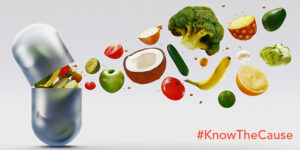

| Crohn’s disease is a serious inflammatory bowel disease affects about 1 in 300 people and can flare up in any part of the GI tract. Crohn’s can cause many serious problems including abdominal pain, diarrhea, fever, weight loss, malnutrition, and fatigue. |
|
Another study of 9 families in France and Belgium reported that stool specimens of Crohn’s disease patients had significantly higher levels of the fungi Candida tropicalis and the bacteria Escherichia coli and Serratia marcescens as compared to the stools of cohabiting first degree relatives without Crohn’s (Hoarau, Mukherjee et al. 2016). Related studies have reported that Candida tropicalis and other Candida species along with the bacteria Escherichia coli and Serratia marcescens frequently form multiple species biofilms in the intestine’s of Crohn’s patients. It is hypothesized that the combination of these 3 organisms may be especially inflammatory and toxic to the intestines. |
| {module FL-VOL1} |
|
|
|
References / Sources |
| {flike} |
|
Related Articles and videos {fcomments} |
Doug Kaufmann has written many books that cover a full range or health issues. Find out which of his books best suits you by clicking the button below.
Doug Kaufmann developed his diet after years studying the clinical effects of pathogenic fungi on the body. Fungi and yeasts can become parasitic organisms on and inside our body, causing health problems that can be difficult to diagnose. Learn more about the Kaufmann Diet, change your life and know the cause.
We encourage all visitors to this site to take some time and study these technical articles prior to initiating lifestyle changes, including dietary changes and to do so with their physician’s awareness and approval. The articles posted in this link are scientific and with few exceptions are taken from medical journals familiar to healthcare workers.
Looking for help assembling antifungal Kaufmann Diet approved recipes for breakfast, lunch or dinner? We have several videos, books and recipe write ups here on Know the Cause that will help your health journey. The recipes in this section are so good, you’ll feel like you’re indulging. No sacrifice needed! Enjoy.
© 2024 Mediatriton Inc. All Rights Reserved • Website by Skynet Solutions